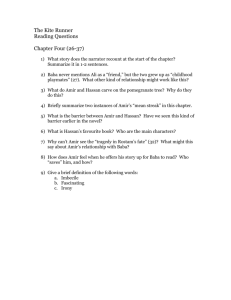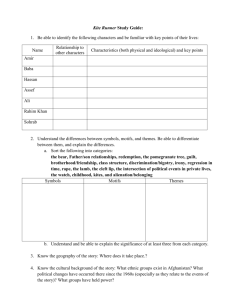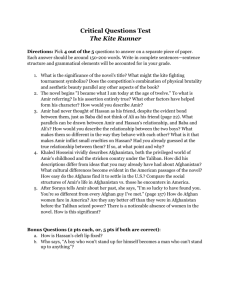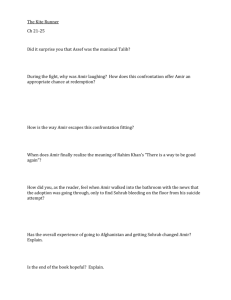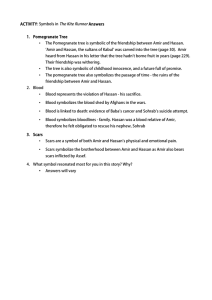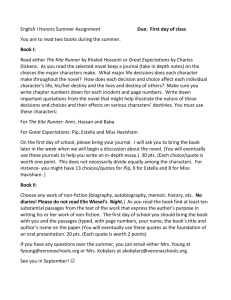The Kite Runner - Ch 7
advertisement
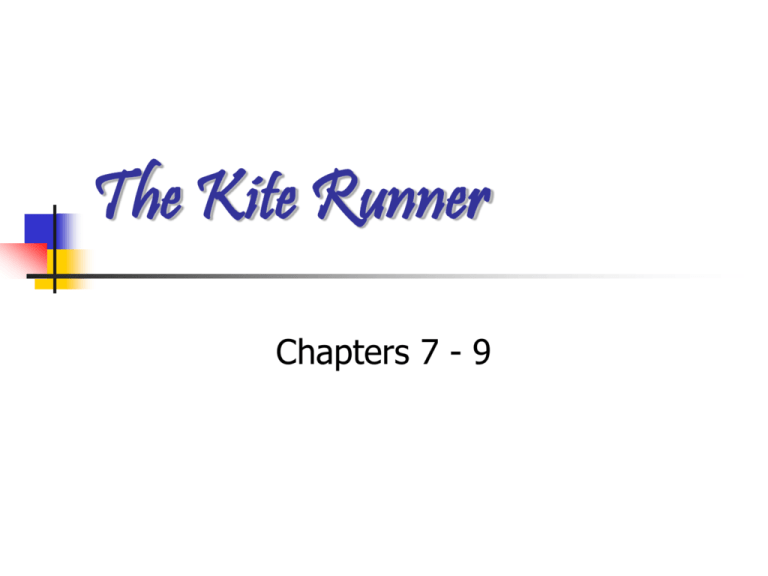
The Kite Runner Chapters 7 - 9 The summaries have been taken from the BookRags guide to The Kite Runner. You will receive the full guide in a revision pack after Christmas. Chapter 7 Summary “In the end I ran.“ The sky is described as ‘a blameless blue’ (p.53). What significance does this take on later in the chapter? The night before the kite tournament, Hassan dreams of rumours of a monster in the lake. Only he and Amir swim safely in the lake. Hassan believes the dream signifies something. Amir ignores Hassan's fears and expresses nervousness about the tournament. Hassan assures him of victory and prays for it. Amir thinks he may be an atheist, like his father. At the neighborhood field, nearly fifty kites fly high. After hours of fighting and dodging, Amir and Hassan fly one of the two remaining kites. He finally wins the tournament and sees his father clap. He plans to present two kites to his father, his own and that o the second place flier. Hassan runs to catch the second place kite, smiling and promising to find it for Amir. Amir remembers this is the last of Hassan's smiles that he sees. Hours later, Amir hunts for Hassan, hoping he has the desired kite. He finds Hassan in an alley, with the blue kite. Assef and his gang surround Hassan. Assef demands the kite, but Hassan refuses, wanting to keep his promise to Amir. Amir watches for his hiding place as the gang beats Hassan. Finally, Assef rapes Hassan as the other boys hold him down. The look on Hassan's face reminds Amir of a sheep just before slaughter. Amir weeps and runs home. One the way, Amir catches up with Hassan. He receives the coveted blue kite, but feels little joy in it. The two boys never discuss what happened in the alley. Commentary – ch.7 We finally witness the event that Amir has been aluding to since ch. 1. Hassan doesn‘t fight what happens but accepts his fate-he gets "the look of the lamb" in his eyes-because his loyalty to Amir makes him willing to suffer even the violent act of rape. Hosseini uses italicized memories to represent Amir's emotional dissociation during the rape. In the alley, he is overcome by fear and he sees images. He shows us that Amir is in a state of panic and inner conflict. Still, he makes a conscious decision to abandon Hassan, whom he feels on some level to be his "sacrificial lamb" and "just a Hazara." Commentary –ch.7 In light of this, we can see the interruption of italicized memories as a representation not only of Amir's confusion and panic, but the moment when he became a true coward. We could dismiss the act of running away because Amir was a frightened child, but after the rape, his fear of being discovered and his capacity for betrayal only intensifies. As Amir says in Chapter One, that moment in the alleyway defined the rest of his life and, twenty-six years later, sent him on a quest for redemption. Chapter 8 Summary . “Hassan milled about the periphery of my life after that. “ Amir goes weeks without seeing much of Hassan. Ali asks Amir something happened after the tournament. Amir denies knowing anything and Hassan just says he is sick. Anxious to get a way an also enjoy his father's newfound pride, Amir suggest a day trip to Jalalabad. Baba agrees, but before the day comes, he manages to invite a crowd. On the way there, he brags on Amir's win in the kite-fighting tournament. Internally, however Amir sees himself as the monster in Hassan's dream. He feels no joy in his time away with Baba. Once thy return, Hassan seeks Amir to makes amends for the rift in their relationship. The continued loyalty from Hassan brings more guilt to Amir. The continued guilt causes Amir to ask Baba why they never hire new servants. Baba reacts with a vehement denial. He says they are Hassan's family. Weeks later, after school resumes, Hassan asks Amir to join him at their tree for a story. Amir goes, but feels too much guilt to enjoy the time. He pelts Hassan with pomegranates until the red juice runs down his face. Hassan refuses o fight back. Amir also notices that his relationship with Baba fades after he questions Ali's job. Nevertheless, Baba throws Amir a large thirteenth birthday party. Local merchant, thankful for Baba's generosity, donate food and supplies. Baba even hires Ahmad Zahir, a famous Afghan pop singer. Assef attends the party with his influential father. Baba reminds Amir to politely accept Assef's gift. Amir throws the book, a biography of Hitler, into a deserted field. Rahim Khan finds Amir sitting alone. He tells Amir of his attempted marriage to a Hazara woman years prior. Rahim Khan assures Amir that his family's intervention was for the best. Amir receives a notebook from Rahim, in which to write his stories. In the light of the fireworks that night, Amir sees Hassan serving drink to Assef and his friends. Commentary – ch. 8 Amir's guilt begins to consume him immediately after the rape. He becomes an insomniac. He cannot bear to be around Hassan, who reminds him of his guilt by merely existing. Instead of making him right his wrong, Amir's guilt leads him into a cycle of wrongdoing. The only thing that sickens Amir as much as his guilt is the fact that Hassan will not do anything to stand up for himself. The incident with the pomegranates embodies Hassan's insistence on 'taking the high road' when it comes to violence and anger. Instead of pelting Amir with pomegranates, he smashes one into his own forehead, as though he is truly incapable of hurting someone else. Chapter 9 Summary . “…it was not the book but I who was unworthy.“ The next morning, Amir sees the pile of gifts as blood money. He thinks he only received the attention and gifts because of winning the tournament, because that caused his father's attention. Baba presents Amir with a bicycle and a watch. Amir only enjoys the notebook from Rahim. As he gazes at the pile of gifts, he decides one of them has to go. The next day, Ali presents Amir with an illustrated copy of the legends the two boys have long enjoyed. After Ali and Hassan leave for the market, Amir hides some of his birthday money and the watch from his father under Hassan's mattress. He reports the theft to his father and waits. Surprisingly, when Hassan and Ali join them in Baba's office, Hassan confesses to the theft. Amir wants to tell the truth, but fears what it will do to his waning relationship with his father. However, all react with shock when Baba forgives Hassan. Yet, Ali says they have decided to leave. He resigns his job. It is then that Ami knows Hassan saw him that day in the alley and has told his father the truth. Baba begs them to stay, crying and pleading, to no avail. Commentary – ch.9 On the one hand, we cannot blame Amir for feeling disconnected from Hassan and Ali; after all, he was raised to know them as servants-cherished ones, but servants nonetheless. Amir's name even means "prince," making it seem as though he should hold such a view. On the other hand, Hassan and Ali are human beings and it is cruel of Amir to treat them as inferior. Amir's actions toward his relatives, even though he does not know they are, call into question the importance of family ties. Discuss with a partner In what way are the final lines of the chapter poetic? Activity for Homework Write one page on the writer’s use of imagery to create specific moods or frame specific attitudes in the opening six chapters. Homework Writing: Write a one page response for the following: Discuss the fact that the characters' names have particular meanings, Rahim = compassionate, Hassan = handsome, Amir = prince. DUE September 7th
